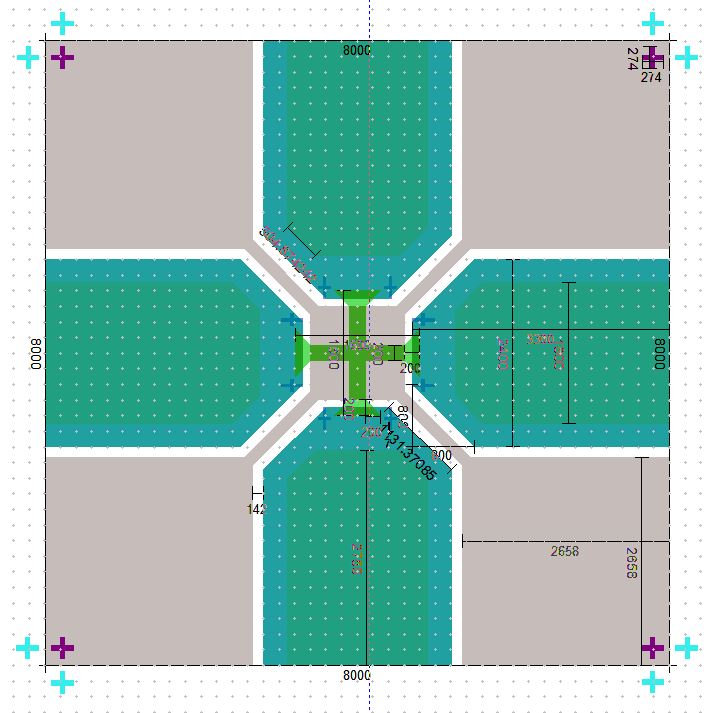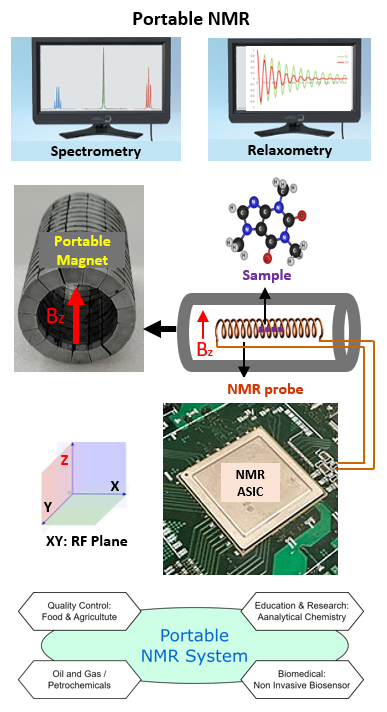Current Projects

ASIC integrated graphene Hall-effect magnetic sensor system
There is a constant need for Hall-effect magnetic sensors with lower noise and lower offset for the high-accuracy analog applications driven primarily by industrial and automotive markets, for example, high dynamic range current sensing for battery management in electric vehicles. Graphene-based Hall sensors (GHSs) demonstrate low thermal noise due to their high carrier mobility but suffer from large low-frequency flicker noise and offset limiting the prevalent low-frequency applications. We have proposed a gate modulation scheme for GHSs that uses dynamic ambipolar operation to up-convert the input magnetic signal to higher modulating frequencies while the offset and flicker noise remain spectrally unchanged and thus enabling thermal noise limited performance. We are currently developing an ASIC to be integrated with GHS for a low-noise, low-offset magnetic sensor system.

Portable NMR (Nuclear Magnetic Resonance) System for Enhanced Sensitivity and Spectral Resolution
Low-field portable Nuclear Magnetic Resonance (NMR) has seen growing interest over the past decade for handheld and industrial applications, particularly in the food and petrochemical sectors, as well as for institutional research and field-based studies. Its compact size, lower weight, reduced power requirements, and cost advantages make it an attractive alternative to conventional bulky high-field systems. However, widespread use is hindered by performance challenges—mainly the instability of low-field permanent magnets, which causes signal sensitivity loss and poor spectral resolution. Our research tackles these challenges with NMR probe design integrated with transmitter–receiver hardware. The system supports a wide range of sample nuclei, enabling robust performance for industrial process monitoring, quality control, and complex NMR experiments in institutional research settings. Looking ahead, this work lays the foundation for developing highly sensitive handheld NMR devices for future applications such as on-site healthcare diagnostics and continuous monitoring, expanding the impact and reach of NMR technology beyond traditional laboratories.

Solid-State Nanopore-Based DNA Sequencing
Solid-state nanopores are emerging as a promising alternative to biological nanopores for DNA sequencing, offering advantages such as superior mechanical robustness, chemical stability, and compatibility with integrated electronic systems. However, a significant challenge lies in accurately capturing meaningful signals during the rapid translocation of DNA molecules, as the events occur on extremely short timescales. We are developing a low-noise, high-performance electronic platform designed to enhance the reliability of sequence detection and to maximize the information content extracted from each translocation event.

Quantum Random Number Generator (QRNG)
A Random Number Generator (RNG) is a system engineered to produce a sequence of inherently unpredictable numbers for diverse applications. This project aims to design an Electronic Quantum Random Number Generator (QRNG) system that exploits fundamental quantum phenomena to achieve entropy levels approaching one, thereby ensuring near-ideal randomness and maximum unpredictability.
